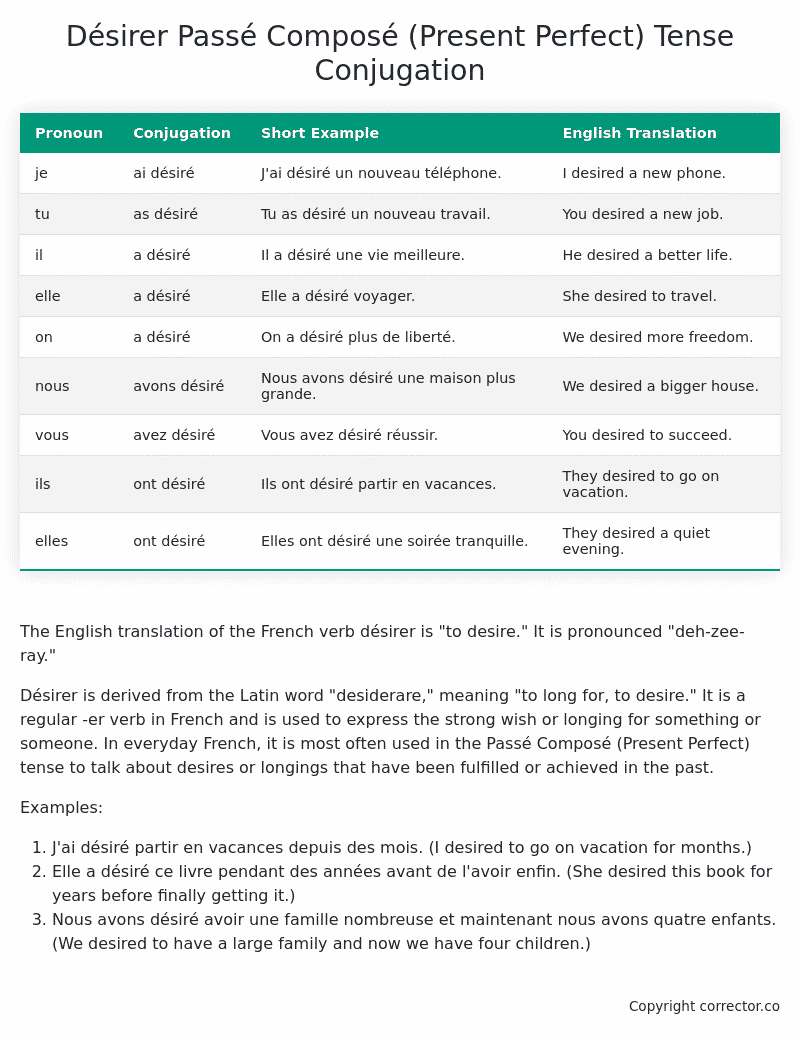Passé Composé (Present Perfect) Tense Conjugation of the French Verb désirer
Introduction to the verb désirer
The English translation of the French verb désirer is “to desire.” It is pronounced “deh-zee-ray.”
Désirer is derived from the Latin word “desiderare,” meaning “to long for, to desire.” It is a regular -er verb in French and is used to express the strong wish or longing for something or someone. In everyday French, it is most often used in the Passé Composé (Present Perfect) tense to talk about desires or longings that have been fulfilled or achieved in the past.
Examples:
- J’ai désiré partir en vacances depuis des mois. (I desired to go on vacation for months.)
- Elle a désiré ce livre pendant des années avant de l’avoir enfin. (She desired this book for years before finally getting it.)
- Nous avons désiré avoir une famille nombreuse et maintenant nous avons quatre enfants. (We desired to have a large family and now we have four children.)
Table of the Passé Composé (Present Perfect) Tense Conjugation of désirer
| Pronoun | Conjugation | Short Example | English Translation |
|---|---|---|---|
| je | ai désiré | J’ai désiré un nouveau téléphone. | I desired a new phone. |
| tu | as désiré | Tu as désiré un nouveau travail. | You desired a new job. |
| il | a désiré | Il a désiré une vie meilleure. | He desired a better life. |
| elle | a désiré | Elle a désiré voyager. | She desired to travel. |
| on | a désiré | On a désiré plus de liberté. | We desired more freedom. |
| nous | avons désiré | Nous avons désiré une maison plus grande. | We desired a bigger house. |
| vous | avez désiré | Vous avez désiré réussir. | You desired to succeed. |
| ils | ont désiré | Ils ont désiré partir en vacances. | They desired to go on vacation. |
| elles | ont désiré | Elles ont désiré une soirée tranquille. | They desired a quiet evening. |
Other Conjugations for Désirer.
Le Present (Present Tense) Conjugation of the French Verb désirer
Imparfait (Imperfect) Tense Conjugation of the French Verb désirer
Passé Simple (Simple Past) Tense Conjugation of the French Verb désirer
Passé Composé (Present Perfect) Tense Conjugation of the French Verb désirer (this article)
Futur Simple (Simple Future) Tense Conjugation of the French Verb désirer
Futur Proche (Near Future) Tense Conjugation of the French Verb désirer
Plus-que-parfait (Pluperfect) Tense Conjugation of the French Verb désirer
Passé Antérieur (Past Anterior) Tense Conjugation of the French Verb désirer
Futur Antérieur (Future Anterior) Tense Conjugation of the French Verb désirer
Subjonctif Présent (Subjunctive Present) Tense Conjugation of the French Verb désirer
Subjonctif Passé (Subjunctive Past) Tense Conjugation of the French Verb désirer
Subjonctif Imparfait (Subjunctive Imperfect) Tense Conjugation of the French Verb désirer
Subjonctif Plus-que-parfait (Subjunctive Pluperfect) Tense Conjugation of the French Verb désirer
Conditionnel Présent (Conditional Present) Tense Conjugation of the French Verb désirer
Conditionnel Passé (Conditional Past) Tense Conjugation of the French Verb désirer
L’impératif Présent (Imperative Present) Tense Conjugation of the French Verb désirer
L’infinitif Présent (Infinitive Present) Tense Conjugation of the French Verb désirer
Struggling with French verbs or the language in general? Why not use our free French Grammar Checker – no registration required!
Get a FREE Download Study Sheet of this Conjugation 🔥
Simply right click the image below, click “save image” and get your free reference for the désirer present perfect tense conjugation!

Désirer – About the French Passé Composé (Present Perfect) Tense
Formation of the Passé Composé
Set the auxiliary verb with either
Conjugate the auxiliary verb
Add the past participle
Common everyday usage patterns
Narrating Past Events
Sequential Actions
Describing Completed Actions
Interactions with other tenses
Imperfect Tense
Conditional and Future Tenses
Summary
I hope you enjoyed this article on the verb désirer. Still in a learning mood? Check out another TOTALLY random French verb conjugation!


